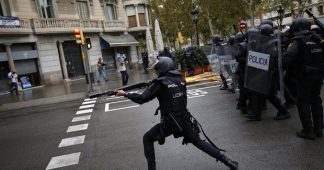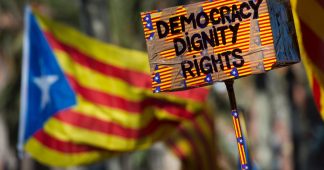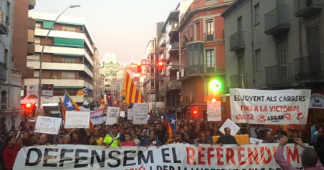Lexit’s Digest Special Issue
27 October 2017
The unilateral independence referendum in Catalonia on 1 October 2017 deservedly attracted much media attention. About 43 percent of voters in Catalonia participated in it, despite the Spanish Constitutional Court declaring it ‘illegal’, and despite massive repression from the Spanish national police Guardia Civil (900 persons injured) trying to bloc the referendum on orders from Mariano Rajoy’s conservative minority government. About 90 percent of those voting in Catalonia were in favour of secession from the Spanish State. What the other 57 per cent of Catalonian voters want, nobody knows. Opinion polls before the referendum showed that the pro-independence forces could perhaps rally around 45 to 48 percent of Catalonian voters to their cause. Why could the Rajoy government not do what the conservative David Cameron did as the UK’s Prime Minister in 2014 – agreeing to a guaranteed and peaceful referendum on Scottish independence?
It’s about Spanish history (Rajoy’s PP still carrying the heritage of the Franco-regime in its ranks). The PP minority government can again polarize Spanish society at large by ‘defending the poorer regions of Spain’ against the ‘rich and egotistic Catalans’. About 63 percent of Spaniards are opposed to Catalonian secession – here is something to build upon ‘nationwide’ for a contested PP…
Rajoy’s PP is only a minority force in the regional Catalonian Parliament (8.5 percent obtained in the 2015 regional elections). So they do not have to bother about regional repercussions amongst their voter base, which anyhow expects a strong stance against independence. By pursuing the ‘legalistic way’ – appealing to the Constitutional Court, and getting its support – the PP can claim that its actions are about defending the Spanish Constitution of 1978 and generally the rule of law. And thus detract voters from the multiple corruption files facing that party. Last but not least, the PP has the support of the neo-liberal Ciudadanos (C’s), which is even more hard-line than them on centralism and the concept of an ‘integral Spanish State’.
On this line, the PP also could reign in the PSOE for a joint pact to defend the Constitution (the ‘regime of 1978’, so much criticized by Podemos and IU). The PSOE’s General Secretary Pedro Sanchez re-conquered that office again with his ‘No to Rajoy’ in an internal competition against the candidate of the PSOE ‘barones’, Susana Diaz (the regional prime minister of Andalusia). He was also trying to reorient his party towards a more ‘federalist’ perspective (Spain as a ‘pluri-national’ state, constitutional reform etc.; thus accommodating to the concept of Unidos Podemos; UP). Finally, the PSOE under the ‘leftist’ Sanchez again succumbed to Rajoy: abstaining on UP’s censure motion in June 2017 against the PP minority government; voting no to UP’s resolution on not to activate Articles 155 and 116 against Catalonia in October 2017 etc. The PSOE is not in a shape to form even a mildly ‘Portuguese’ alternative with UP and some other regionalist partners, although an arithmetic majority in the upper house of the Spanish parliament (the Cortes) for such an option exists. The Spanish ‘centre’, the defenders of the ‘regime of 1978’ – PP, C’s, PSOE – currently stand together to the benefit of Rajoy’s minority government.
The Catalan independentists (Junts pel Si, composed of the liberal PDCat, the social-liberal ERC and others, and the oppositional anti-capitalist CUP) in 2015 together gained 47.8 percent of the regional vote. With this they attained an absolute majority of seats in the Catalonian parliament. Their common aim was to unilaterally declare secession from the Spanish State within 48 hours after the referendum of 1 October 2017. This did not happen. The regional Prime Minister Puidgemont (PDCat) stated on 10 October that the referendum result is valid, but that independence was suspended in favour of seeking a dialogue with the central government and the international community. This approach led to (mild) criticism from the ERC, and harsher reactions from the CUP.
Background to Puidgemont’s hesitations were threats from Catalonian companies to re-locate their juridical seats to other regions of Spain (which many of them already did, courtesy of ‘fast track procedures’ enabled by central government). Capital is a shy deer, and also in Catalonia not very ‘patriotic’. If many big firms move out, this means a serious erosion of the tax base and of the fiscal strength of an independent Catalonian Republic. Puidgemont also played on gaining time for getting more international support, mediation from the EU-Commission etc. However, the October 2017 EU-Summit fully supported Rajoy’s position, only the Belgian government had some reservations on this. Puidgemont accused Rajoys government of preventing a last-minute deal on solving the institutional crisis. He offered to dissolve the Catalan parliament and call an early election (which PP, PSOE, C’s had demanded earlier on) in order to de-escalate tensions with Madrid. But he wanted guarantees for a fair election (and possibly also about ending juridical prosecution against independentists), which Rajoy didn’t seem to be willing to concede.
Finally, on 27 October the Catalonian regional parliament adopted a declaration of independence (with Junts pel Si and CUP voting in favour, see also here). On the same day, the Spanish Senate (the PP commanding an absolute majority in that second chamber of the national parliament) had voted for activating Article 155 of the Constitution (putting Catalonia under control of the central government). As the confrontation between the central government and Catalonia escalates, future twists and turns from both sides are to be expected. Their outcome is unpredictable at this stage.
The next step according to Rajoy’s ‘legalistic’ approach would be to initiate juridical prosecution against Puidgemont and other leading figures of the Catalonian regional government. The problem for Rajoy is: how to enforce compliance by the regional administration in Catalonia (e.g. the regional police force ‘Mossos‘, the financial administration, the municipalities etc.) to the orders of the central state. This looks complicated. If his government ‘overreacts’ with repressive measures, the EU and the ‘international community’ will be very ‘concerned’ (if only about the stability of bourgeois rule in Spain). The latter is the hope of the moderate Catalan independentists – that they can get these international forces ‘in’ to mediate between the central Spanish State and Catalonia.
On the other hand: how loyal is the regional state apparatus to the declaration of an independent Republic of Catalonia? Will further general strikes, demonstrations, civil disobedience etc. suffice to stare the central government down and enable ‘dialogue and negotiations’? In the break-up of Yugoslavia, e.g. the Slovene and Croatian separatists had well armed and trained militias at their disposal (‘hard power’), and diplomatic (and other) support for secession from the Western powers. Concerning Catalonia, this is not the case. The anti-capitalist CUP may strive for a fully-fledged ‘Socialist Republic of Catalonia’, but what this would mean in terms of popular (and possibly military) confrontation with the Spanish State seems to be far from clear. Memories on the run-up to the Spanish Civil War in the 1930ies (the declaration of independence of Catalonia by its regional President Lluis Companys of the ERC in 1934, the following repression, his execution by the Franco regime in 1940) are still alive. No one wants a repetition of these nightmares – currently it is a ‘war of propaganda’ on both sides (the Catalan independence movement on one side, the forces of the ‘regime of 1978’ on the other).
The Spanish Left (Podemos, IU and their regional allies) always took a ‘third position’ in the conflict: yes to a guaranteed referendum on Catalonian independence (‘the right to decide’); no to Catalonian secession and no to the unilateral referendum; yes to a ‘constituent assembly’ and constitutional reform towards a pluri-national, federalist Spanish State. Their regional alliance En Comu Podem currently is one of the strongest parties in Catalonia. They are warning: if Catalonia breaks away from Spain, there is no perspective for ‘cambio‘ (progressive ‘reformist’ political change) at national level. With the current escalation, this ‘third position’ has been quite sidelined. To achieve a federalist constitutional reform with an absolute PP majority in the Senate – this is hard to explain as a ‘realistic perspective’. So the defenders of the ‘regime of 1978’ – despite internal quarrels on how to move on, how to dose a convincing mix of ‘dialogue’ and ‘repression’ – they have their fingers on the trigger.
What follows now, is simply a reading list for all those interested in the development of the battle over Catalonia, focusing on different views from the left.
Andrés Gil interprets Rajoy’s moves on the conflict as a victorious ‘Schmittian reaction’ over ‘Gramscian hegemony’ (in Spanish). Carl Schmitt was a political theorist of the ‘conservative revolution’ in Germany between the two World Wars and later on the ‘crown jurist’ of the Nazi Third Reich. His famous statement ‘Sovereign is he who decides on the state of exception‘ has (analytically) fascinated quite a number of leftists – so this is a point of reference in Gil’s thought provoking comment.
The director of ‘el diario’, Ignacio Escolar, provides an illuminating analysis of the failed attempts towards ‘dialogue’ (in Spanish) between Puidgemont and Rajoy, and on whether the declaration of independence was suspended or not.
On the history of the battle over Catalonia, Luke Stobart (pro-independence) provides a very informative overview, from the Spanish Congress of 1812, the Civil War in the 1930ies up till today.
Josep Maria Antentas piece (written before the 1 October referendum, also pro-independence) is very informative about the more recent rise of the independence movement, its social composition and its aims.
An interesting interview on jacobin.mag with Lluc Salellas (a member of the CUP’s national executive) provides interesting insights on the thinking and strategy of the pro-independence anti-capitalists.
Podemos MP Txema Guijarro explains his party’s views on alternatives for Catalonia (against independence).
Very sharp and illuminating is the controversy between Alberto Garzón (leader of Izquierda Unida) and Pau Llonch (CUP): Debating Catalonia, marking the differences in theory and strategy between the Unidos Podemos camp and the CUP to the point.
Finally, Yanis Varoufakis – as always – has his own particular views (Spain’s crisis is Europe’s opportunity), as does Paul Mason (Why the fight for self-determination now?).
The battle over Catalonia seems to inspire a lot of ‘experts’ in the broader ‘progressive camp’ on ‘thinking bold’ about ‘future Europe’. Want some examples? Here you go: Daphne Büllesbach and Lorenzo Marsili ask on open democracy.net: Catalunya and beyond – What’s after the nation state?. Thomas Seibert (of DIEM25) dreams of “the city as cosmopolis, and it is the cause of a federation of cities as a cosmopolitan federation: a federation of individuals.” He concludes with regard to the Catalonian crisis: “The good part of this is that in the cosmopolitan trajectory path and goal always coincide. Spain is dead, this EU is dead.” Sounds quite ‘Marxian’: the Paris Commune, the idea to organise France as an alliance of self-governed communes in the late 19th century etc.; an alliance of emerging ‘rebel cities’ today – so towards a vision of a cosmopolitan ‘commune state’? But what about Marx’ analysis on the failure of the Paris Commune?
Ulrike Guérot (of the European Council for Foreign Relations) argues in a similar manner for a ‘European Republic’ conceived as a ‘Europe of regions’ (in German): dissolving the nation states, empowering the 50 to 60 regions in the EU as its consitutive units, governed by a federal ‘European democracy’ on top (see her simplistic scheme here). Citing her Austrian brother in arms, the writer Robert Menasse (winner of the German book prize 2017): “Nation is fiction, region is home“. Apart from the question whether such utopias are desirable, viable or not: Considering bourgeois rule, the existing coercive apparatus of nation states, imperialism, class and power relationships – all these are no questions for them. Their ‘model solutions’ simply boil down to convincing the current elites about changing their present course by appeal and encouraging ‘democratic discourse in civil society’. Maybe good intentioned – but quite naive, isn’t it?
Well, have a good read on all of this – there are a lot of conflicting arguments amongst the lefties and progressives …











